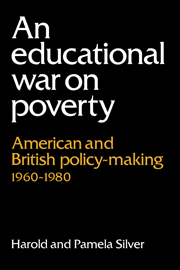Book contents
- Frontmatter
- Contents
- Acknowledgments
- List of abbreviations
- 1 Introduction: a proper complexity
- Part I A pattern of events: United States
- 2 Poverty and education: changing concerns and concepts
- 3 Education: children and intervention
- 4 Learning their way out of poverty?
- 5 Education and the prime target
- 6 An effort to understand
- Part II A pattern of events: Britain
- Part III Following through
- Interviews and consultation
- Bibliography
- Index
6 - An effort to understand
Published online by Cambridge University Press: 03 October 2009
- Frontmatter
- Contents
- Acknowledgments
- List of abbreviations
- 1 Introduction: a proper complexity
- Part I A pattern of events: United States
- 2 Poverty and education: changing concerns and concepts
- 3 Education: children and intervention
- 4 Learning their way out of poverty?
- 5 Education and the prime target
- 6 An effort to understand
- Part II A pattern of events: Britain
- Part III Following through
- Interviews and consultation
- Bibliography
- Index
Summary
Evaluation had made a grand entry into the vocabulary of social science and social action. An evaluation movement, especially in education, had been created, though it became most visible with the publication in 1966 of the Coleman report on Equality of Educational Opportunity, a report on segregation and education that had been commissioned by Congress under the Civil Rights Act. The Coleman report was the outcome of a major national survey, and it brought large-scale research into the service of policy-related evaluation. Between 1964 and 1966, however, the programmes we have been considering developed their own evaluation momentums of different kinds. Consideration of judgments that were emerging with regard to the educational war on poverty is a question of reviewing not just formal evaluations but also opinion more widely. It means considering the components and vocabularies of programmes and processes, the theories and ideologies they represented, the nature of the applause and the critiques becoming as important as the programmes themselves. Within their brief to report on the lack of educational opportunities ‘ by reason of race, color, religion, or national origin’, the Coleman team underlined the process of which it formed one part:
The survey is, of course, only one small part of extensive and varied activities which numerous institutions and persons are pursuing in an effort to understand the critical factors relating to the education of minority children…
(A: Coleman, 1966, 1)It is with this ‘effort to understand’ the processes affecting not only minority children but also the ‘ children of the poor’ as addressed by Title I and other measures, that we are concerned in this chapter.
- Type
- Chapter
- Information
- An Educational War on PovertyAmerican and British Policy-making 1960–1980, pp. 114 - 144Publisher: Cambridge University PressPrint publication year: 1991



